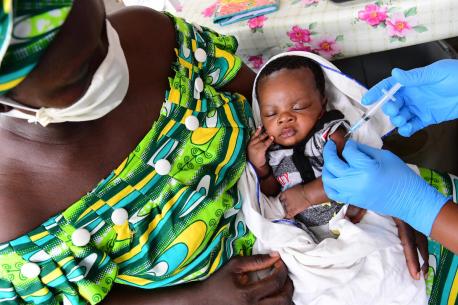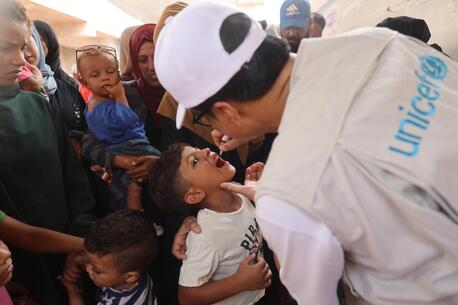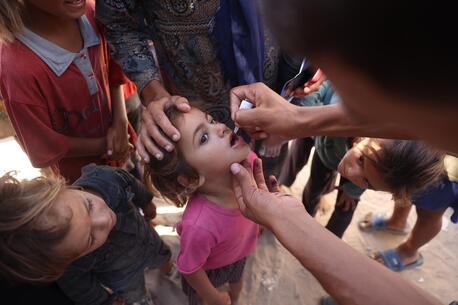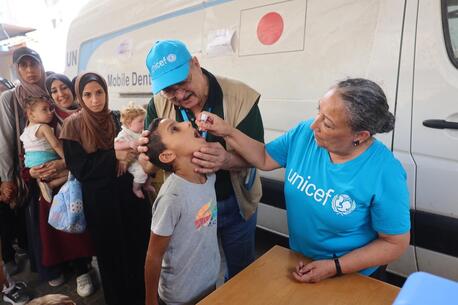
Vaccinating the World's Children as Critical as Ever
A call to action to prevent COVID-19 from wiping out decades of progress against vaccine-preventable diseases.
There’s nothing like a pandemic to remind the world what a difference a vaccine can make — of what's at stake when there is no such protective shield against a dangerous infectious disease, how fast an outbreak can spread when there's nothing to stop it.
There is no vaccine to protect against COVID-19, the novel coronavirus that as of April 21 had infected nearly 2.5 million people globally and caused 169,046 deaths, according to the World Health Organization. Even with multiple efforts under way to develop one, experts caution it could be 12 to 18 months until it is widely available.
But there are safe and effective vaccines available to protect against measles, mumps and rubella, rotavirus, polio and pertussis. And immunization as a public health intervention has been wildly effective.

Nine-month-old Christine plays with her immunization record while waiting to get her measles vaccine at Nyakuron Primary Health Care Center in Juba, South Sudan, where UNICEF is supporting immunization efforts that had lapsed due to ongoing conflict in the country. © UNICEF/UNI314713/Ryeng
The measles vaccine alone has saved an estimated 23.2 million lives since 2000. New vaccines have helped tip the scales against deadly Ebola. (For more vaccine success stories, visit cdc.gov.)
For vaccines to do their job, however, communities need to maintain 95 percent or better immunization rates. When there are lapses in immunization coverage — due to conflict or complacency, lack of information or access — outbreaks occur.
And now COVID-19 has thrown a giant wrench into the works. The demands of responding to the current crisis are straining health systems that are already overstretched, making it difficult if not impossible to keep up with routine, basic yet essential care — including lifesaving vaccinations.
Even before the pandemic, an estimated 20 million children under age 1 were missing out on critical vaccinations every year
Even before the pandemic started, measles, polio and other vaccines were out of reach for millions of children. From 2010 through 2018, an estimated 182 million children under age 1 missed out on at least one critical dose, according to UNICEF and WHO data. More than 13 million children did not receive any vaccines at all in 2018.
In West and Central Africa, coverage rates for the diphtheria, tetanus and pertussis (DTP3) and polio vaccines had stagnated at 70 percent, the measles vaccine at 71 percent.
And now tens of millions more children — in all regions of the world — are at risk of missing out.
Over a dozen countries have already suspended their measles vaccination campaigns for children, with another dozen or so countries expected to soon follow suit. Many of the children who will be impacted live in areas already contending with measles outbreaks. The Democratic Republic of the Congo, for example, lost 5,300 children to measles since early 2019 while the country has focused on fighting Ebola. Ukraine, Madagascar, Brazil, the Philippines and Kazakhstan are all responding to deadly measles outbreaks as they try to cope with the new coronavirus.
UNICEF's World Immunization Week call to action: don't let immunizations fall victim to COVID-19
World Immunization Week (April 24-30) offers an opportunity to revisit the pivotal role that vaccines have played, and continue to play, in public health — and for UNICEF and partners to warn against losing ground against vaccine-preventable diseases. Thanks to the polio vaccine, for example, polio is close to being eradicated. Maternal and neonatal tetanus, which is fatal in newborns, has been eliminated in all but 12 countries. Crossing the finish line on both diseases requires closing all remaining immunity gaps, and maintaining optimal coverage.
New guidelines from the WHO aim to help countries sustain their immunization activities, and mitigate the risks of any delays. While temporarily pausing vaccinations may be necessary to prevent the spread of COVID-19, leaders are urged to keep careful track of children who miss out, so they can be reached as quickly as possible once services can resume.

A 3-year-old girl receives a vaccine at a community health center in Beijing on March 26, 2020. Vaccination services had been halted due to pandemic concerns, but have gradually resumed in all China provinces except Hubei, the epicenter of the COVID-19 outbreak in the country. © UNICEF/UNI315081/Yuwei
The guidelines also urge governments to continue engaging with communities on the issue, to ensure demand for vaccines remains strong. UNICEF advises parents and caregivers to make sure children receive their routine immunizations while heeding local measures aimed at COVID-19 prevention, including physical distancing, hand washing and proper coughing/sneezing hygiene.
As the world's leading procurer of vaccines, UNICEF is working to ensure countries have adequate supplies
As the world's leading procurer of vaccines, UNICEF is also working with governments to ensure countries can maintain adequate supplies, despite current restrictions on international transport and other disruptions in global supply chains caused by the pandemic. UNICEF is working directly with suppliers as well to ensure continued vaccine production. In 2019, UNICEF procured over 2.4 billion doses of vaccines for 100 countries, reaching approximately 45 percent of the world’s children under the age of 5.
"The message is clear," UNICEF Executive Director Henrietta Fore said. "We must not allow lifesaving health interventions to fall victim to our efforts to address COVID-19."

Polio vaccinators go door to door in Kart-e-Naw, a suburb of Kabul. UNICEF is the provider of the polio vaccine in Afghanistan and supports the country's efforts to distribute critical supplies, especially in high-risk areas. Through UNICEF efforts, quality vaccines arrive on time and waste is minimized. UNICEF also works with communities to dispel myths around polio vaccination through intensive efforts to scale up engagement in priority districts by mobilizing community and religious leaders and others to help raise awareness, knowledge and commitment, and organizing volunteers and social mobilizers to educate caregivers of missed children and those refusing vaccination, among other activities. © UNICEF/UN0339998/Dejongh
Countries with the weakest health systems will need the most help reaching every child with lifesaving vaccines. Support UNICEF's efforts to make sure the world's most vulnerable children do not miss out.
To learn more about how vaccines keep children and communities safe, visit UNICEF's World Immunization Week online content hub.
Top photo: A nurse vaccinates a baby at the health center in Gonzagueville, a suburb of Abidjan, Côte d'Ivoire, where masks and gloves are worn to protect against COVID-19. © UNICEF/UNI316687/Dejongh
HOW TO HELP
There are many ways to make a difference
War, famine, poverty, natural disasters — threats to the world's children keep coming. But UNICEF won't stop working to keep children healthy and safe.
UNICEF works in over 190 countries and territories — more places than any other children's organization. UNICEF has the world's largest humanitarian warehouse and, when disaster strikes, can get supplies almost anywhere within 72 hours. Constantly innovating, always advocating for a better world for children, UNICEF works to ensure that every child can grow up healthy, educated, protected and respected.
Would you like to help give all children the opportunity to reach their full potential? There are many ways to get involved.





